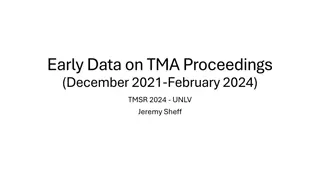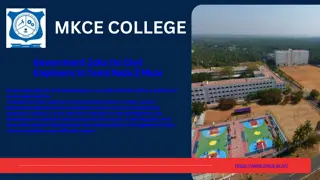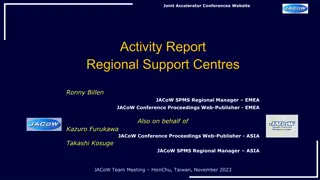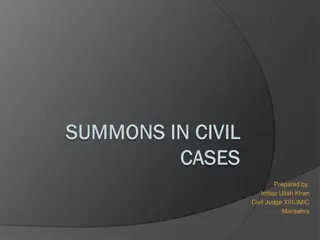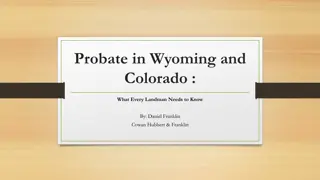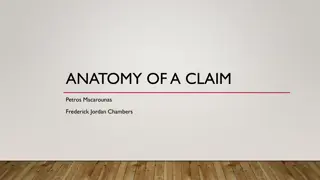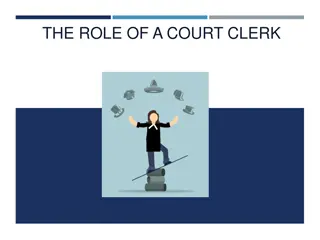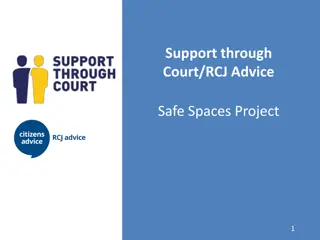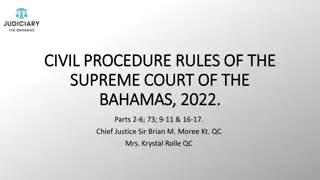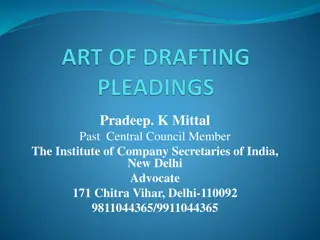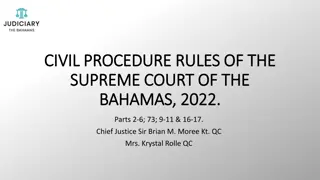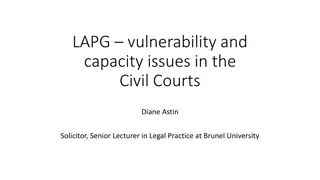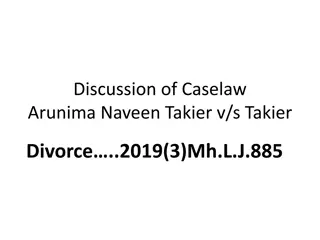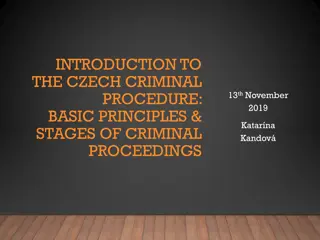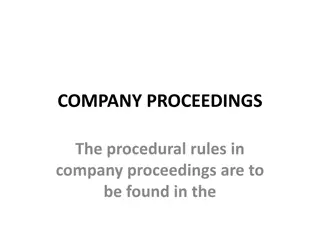Key Principles of Pleading in Civil Proceedings
Pleadings in civil proceedings serve the critical purpose of defining issues and providing fair notice to all parties involved. Key rules such as claimant and defendant duties, need for concise statements of facts, and importance of informing parties in advance are emphasized through legal precedents. The proper preparation of pleadings helps prevent surprises and ensures a transparent legal process.
Download Presentation

Please find below an Image/Link to download the presentation.
The content on the website is provided AS IS for your information and personal use only. It may not be sold, licensed, or shared on other websites without obtaining consent from the author.If you encounter any issues during the download, it is possible that the publisher has removed the file from their server.
You are allowed to download the files provided on this website for personal or commercial use, subject to the condition that they are used lawfully. All files are the property of their respective owners.
The content on the website is provided AS IS for your information and personal use only. It may not be sold, licensed, or shared on other websites without obtaining consent from the author.
E N D
Presentation Transcript
The Preparation of Pleadings Kerwyn Garcia Attorney at Law
Rule 8.6(1) of the Consolidated Civil Proceedings Rules 2016 ( the CPR ) Claimant s duty to set out his case 8.6 (1) The claimant must include on the claim form or in his statement of case a short statement of all the facts on which he relies.
Rules 10.5(1) and 10.5(2) of the CPR Defendant s duty to set out his case 10.5 (1) The defendant must include in his defence a statement of all the facts on which he relies to dispute the claim against him. (2) Such statement must be as short as practicable.
The pleadings must contain fair and proper notice of the issues intended to be raised. This is essential to prevent the other party being taken by surprise . Palmer v Guadagni [1906] 2 Ch 494, per Swinfen Eady J at page 497.
Cases must be decided on the issues on the record; and if it is desired to raise other issues they must be placed amendment. In the present case the issue on which the judge decided was raised by himself without amending the pleadings and in my opinion he was not entitled to take such a course . on the record by Esso Corporation [1930]1 KB 628, per Lord Norman at page 634 Petroleum Company Ltd v Southport
To shrug off a criticism as a mere pleading point is ... bad law and bad practice. For the primary purpose of pleadings remains, and it can still prove of vital purpose is to define the issues and thereby to inform the parties in advance of the case they have to meet and so enable them to take steps to deal with it. importance. That Farrell v Secretary Of State For Defence [1980] 1 WLR 172, per Lord Edmund-Davies, at page 180
...the purpose of pleadings is to define the issues and give the other party fair notice of the case which he has to meet . Barclays Bank v Boutler [1999] 4 All E.R. 513, per Lord Hoffman at page 517
Pleadings parameters of the case that is being advanced by each party. In particular they are still critical to identify the issues and the extent of the dispute between the parties. What is important is that the pleadings should make clear the general nature of the case of the pleader. This is true both under the old rules and the new rules. are still required to mark out the McPhilemy v Times Newspapers Ltd [1999] 3 All ER 775, per Lord Woolf MR at pages 792 793 [quoted and applied by the Privy Council in Bernard v Seebalack [2010] UKPC 15, at para 15].
For the sake of certainty and finality, each party is bound by his own pleading and cannot be allowed to raise a different or fresh case without due amendment properly made... It is no part of the duty or function of the court to enter upon any inquiry into the case before it other than to adjudicate upon the specific matters which the parties themselves have raised by their pleadings.... Jacob, published in (1960) Current Legal Problems, at pages 171, 174 The Present Importance of Pleadings ,
Pleadings do not only define the issues between the parties for final decision of the court at the trial; they manifest and exert their importance through the whole process of litigation...They contain the particulars and the allegations of which [Requests For Information] may ordered...They limit the ambit and range of the [disclosure] of documents... be requested or
Contd They show on their face whether a reasonable cause of action or defence is disclosed. They provide a guide for the proper mode of trial and particularly for the trial of preliminary issue of law or fact. They demonstrate upon which party the burden of proof lies and who has the right to open the case. They determine the range of admissible evidence which the parties should be prepared to adduce at trial. They delimit the relief which the court can award... Jacob, The Present Importance published in (1960) Current Legal Problems, at pages 175 - 176 of Pleadings ,
Mars v Al-Medinni, reported on at [2005] EWCA CIV 1041 Consequences of Not Reading The Facts
Nickels Sports Club and Otis Thomas v Nigel Scott CV 2017 - 03067, per Mr. Justice Harris at para 8: ...the pleaded case for the claimant and defendant [must].... foreshadow the evidence contained in the witness statements whether in support of the claim or in opposition to the claim as the case may be.
Zanim Meah John v Allsop and Others CV2010-04559 Mr. Justice Kokaram on fraud under the Real Property Ordinance
10. There was not, at this or at any material time, brought home to the Third Defendant the fact of any fraud in relation to the Power of Attorney aforesaid. The suspicions in relation to the said Power of Attorney were not Defendant did not inquiries concerning Attorney for fear of learning the truth. The Third Defendant thereafter and at all material times proceeded in relation to the said Power of Attorney in the honest belief that same was a genuine document which could properly be acted upon . Third Defendant s aroused. abstain the The Third from making Power said of
The basic admonition to the lawyer who is sitting down to write the Argument is simply this: never start to write until you have thought the case through and have completed your basic research. That doesn t mean every citation or footnote, but it does include a reading, and, whenever required, a re- reading, of all the important cases because the basic authorities are always full of suggestive leads for further development. Oliver Wendell Holmes - Holmes-Laski Letters 684 (Mark D. Howe ed., 1953)
Let us assume you have the information all ready to assemble. Some of it is in your mind, some of it in charts or other reports in front of you, some of it in rough notes on a piece of scratch paper. The ideas you want to put across are clear enough to you, but expressing them will take at least a couple of pages and maybe much more. You have lived with these ideas; you are literally steeped in them. How in the world, you wonder, am I to put the gist of them in a short opening paragraph or section? They re just not that simple!
Contd You practically every good writer has done since the first cogent stone tablet was delivered by a caveman messenger: Step back mentally from the details and try to see just the essence of the message. Admittedly, this is easier said than done; but any writer of any message, no matter how complex, can do it if he or he wants. need to do the same thing that David W. Ewing Writing Essentials for Results in Business, Government and the Professions
In my judgment a balance must be struck between the need for fair notice to be given on the one hand and excessive demands for detail on the other. Madame Justice Mohammed, in Jagessar Agency Company Limited Company Limited CV 2018 00413, quoting from Lord Hope in Three Rivers District Council and ors v Bank of England (No 3) at para 49. v The CEPEP
On the other hand it is clear that as a general rule, the more serious misconduct, the greater particulars to be given which explain the basis for the allegation. This is especially so where the allegation that is being made is of bad faith or dishonesty. The point is well established by authority in the case of fraud the is allegation the need of for Lord Hope in The Three Rivers case
The litmus test as it were, to start the conversation about the adequacy of the pleadings, is simply this: If the claimant were to prove the facts alleged in the statement of case, would it make out a case for a breach of contract/promissory note, executed as alleged in the pleadings? Similarly, if the defendant s pleaded facts were to be believed over that of the claimant would it displace the claim and claim/defence on its Defence and counterclaim? further, make out a Mr. Justice Harris in the Nickel s Sports Club case
Devon County Council v Clarke [2005] EWCA Civ 266, [2005] All ER (D) 285 (Mar) The risks of overpleading
Organizing pleasant and profitably, but organizing after writing is wasteful irritating, and inefficient. Planning is not the second, third, or fourth step; it must be the first. thoughts before writing is Arthur Schopenhauer, On Style (1851), in Theories of Style in Literature 251, 269 (Lane Cooper ed., 1923)
Few write the way an architect builds, who first sketches out his plan and designs every detail. Rather, most people write only as though they were playing dominoes, where the pieces are arranged half by design, half by chance; and so it is with sequence and connection of their sentences Arthur Schopenhauer, On Style (1851), in Theories of Style in Literature 251, 269 (Lane Cooper ed., 1923)
When you have found your idea write it down as nearly as possible as you would express it in speech; swiftly, unselfconsciously, without stopping to think about the form of it all. Revise it afterwards but only afterwards. To stop to think about form in midcareer, while the idea is in motion, is like throwing out your clutch halfway up a hill and having to start in low again. You never get back your old momentum . David Lambuth et al., The Golden Book on Writing (1964)
No one can expect a finished essay in a single draft, and no one (except the green beginner or the newspaperman who is short of time) ever tries. Although students have ben told the virtues of second and third drafts from the time they learned to write, they are still reluctant to take the trouble.
Contd The results are scandalous. Sentences don t parse; verbs are written in the wrong person and tense; the style is jerky; the order disconcerting; very frequently, even the sense is gone. The only way to iron out the manuscript is to re-read it (read it aloud if possible), correct it, revise it and rewrite it . Sherman Kent, Writing History (1949)










